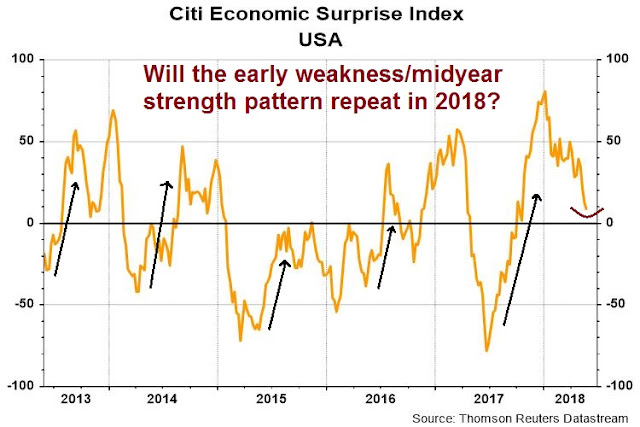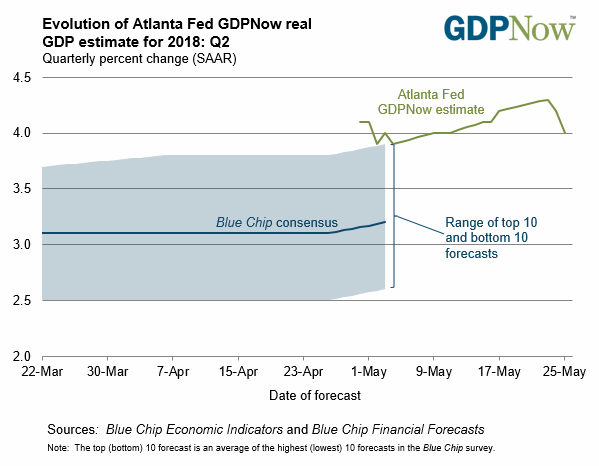Brett Steenberger recently warned that traders about trading on noise, which is advice to which I wholeheartedly agree:
In other words, before we can determine whether or not we have an edge (in systematic or discretionary trading), we need to establish knowledge. A theory explains how and why something occurs. Testing of historical data can help us conduct limited, targeted tests to determine whether our theory holds up in practice. Before we test, we must formulate a plausible hypothesis. There is no theoretical or practical rationale why many strategies in technical analysis, fundamental analysis, or random combinations of quantitative variables should be valid.
With that caveat, I offer two offbeat forecasts for the markets for this coming Thursday and Friday.
A QT warning?
Kevin Muir at The Macro Tourist observed that stock prices seem to take a tumble whenever the Fed wound down its balance sheet.
It’s hard to find a direct reason for the stock market weakness during QT days. The Fed does not sell its bond holdings as part of its Quantitative Tightening (QT) program, but it decided to allow issues to mature and roll off its balance sheet. Therefore there are no market transactions, and the maturity of its security holdings should have no direct market impact, either on the bond, forex, or stock market.
Despite my skepticism, I made a quick study of my own using weekly data and found a weak negative influence on stock prices in 2018, though the sample size is small.
Nevertheless, a market effect has been observed. The New York Fed publishes the details of the Fed’s security holdings, and the next big day is Thursday, May 31, 2018, when about $28 billion rolls off the balance sheet.
Will we see a significant market downdraft on Thursday? That’s what out-of-sample model testing is for.
A blowout Jobs Report?
Friday’s forecast is based on more reliable evidence. The markets had interpreted the latest FOMC minutes in a dovish fashion because of the focus on a symmetrical inflation objective, indicating that the Fed is willing to tolerate some inflationary overshoot of its 2% target. How would the market react if we were to see a significant upside surprise in the May Jobs Report scheduled to be released this Friday?
The chart below shows a simple heuristic that plots the 4-week moving average of initial jobless claims (blue line, inverted scale) with headline NFP. Initial claims for the week ending May 12, 2018, which corresponds to the survey period of the Jobs Report, set a low that was exceeded only back in the 1960’s. This suggests that we should see a blowout May NFP figure this Friday.
Expectations is for an increase of 185K jobs. I would take the over.
If I am correct, then the bond market won’t like the results. On the other hand, the stock market reaction will be a key test of investor psychology. Will good (economic) news be interpreted as good (stock market) news, or bad news? The Citigroup Economic Surprise Index has shown a pattern of weakness early in the year and then a strong recover midyear. Could the NFP kick off that strength?
The Atlanta Fed’s GDPNow is flashing an astounding 4.0% level for Q2 growth.
Stay tuned for possible fireworks Friday.






Hmmm…Ross‘ pending visit to China might dampen any kind of enthusiasm on Friday. Next few days is also a test on renewed toughness in trade negotiations.
Ok, I‘m a novice when it comes to political trade deals. WSJ says preliminary talks are being held today and if the Ross trip does not get canceled, that would be a good sign.
Jan
China can reduce buying oil from the middle East and substitute it for buying American oil.
It can do the same for Soyabeans and Corn. It can import less soyabeans and corn from South America and buy more from the US. These are some of the things China can do, to help with US trade imbalance with China.
Whether the US has ability to supply more commodities is another matter (Full US employment may make it difficult to increase commodity production).
What China really wants to buy from the US, is advanced technology, which the US may not want to sell to China. What else, would China want to buy from the US, that it does not make in its own country or can buy from non-US suppliers. That is where the rub is. China has asked this question of the US. What else do you have that we can buy from you?